It’s difficult to know how to approach a film like this owing to how close to the bone a documentary on a movie critic cuts to another movie critic. It’s perhaps more difficult if you have — as I do — mixed feelings about the critic it examines. (I think I like Roger Ebert the person and Roger Ebert the lover of movies more than Roger Ebert the critic.) And after you traverse the minefield of almost unstinting praise for both the film Life Itself and Ebert, it’s impossible not to feel like a churl if you don’t join the chorus. The sense of hagiography that permeates the film is evident from the poster of an idealized, positively beatific Ebert, ethereally backlit by the light of a projection booth, staring in rapt wonder at an unseen movie screen. (It is perhaps the most cloying poster I’ve ever seen.)
The strange thing about this is that the film itself devotes a great deal of its energy — probably about a third of its nearly two-hour running time — showing Ebert in the last days of his life, shining a pitiless light on his post-operation physical condition. This footage — the only time documentarian Steve James had access to his subject — forms the structure of the film and is the one continuous narrative in the movie. I understand why this was the chosen approach. I get the sense that it expresses Ebert’s own refusal to hide from public scrutiny. What I am not sure of is the wisdom of this. It is sometimes hard to watch — not just in the obvious ways, but there is a growing sense of not being sure we should be seeing this. It will not play well to anyone who would prefer to remember him in his more vibrant days.
Overall, it’s a fairly on-target encapsulation of Ebert’s life, though I’m not sure it’s particularly revelatory. I liked learning the story of the Balkan Sobranie jigsaw puzzle that Ebert gave to Ramin Bahrani (a filmmaker Ebert tirelessly championed), but I doubt whether it substantially altered my image of the man in any significant way. The segments detailing his relationship with his TV co-star Gene Siskel are the best and the most complex in the film — not in the least because some of the things it tells us about Siskel are much fresher than so much of what we’re hearing and seeing about Ebert. Siskel’s widow, Marlene, has far and away the most revelatory and moving observations.
What we end up with — and what I guess was wanted by Chaz Ebert — is a kind of celebration of Ebert. There’s not a dissenting voice in the crowd. No one points out that Ebert had the great good luck to become a movie critic, mostly on the whim of the Chicago Sun-Times‘ publisher, at the exact same time film criticism was coming into its own. This was something that had more to do with Andrew Sarris and Pauline Kael than with Ebert, regardless of how you feel about them. Sarris is probably more responsible than anyone for the way we now associate the director with the movie. They’d been responsible for helping to legitimize movies — and movie criticism — as an art form to be taken seriously. The times were ripe for this. Older movies were being looked at anew, partly as a by-product of the nostalgia boom, and it is this already plowed and fertilized field where Ebert landed. If he added anything truly new to the mix — apart from self-promotion (at which he excelled) and the odious thumbs-up brand of criticism — it was the personalization of criticism, and that developed over the years. His increasingly anecdotal approach to criticism was a definite break from the academic — more so than Kael or Sarris ever quite did. The exact value of this may be arguable, though I think it has a place. Not only does it make for a more conversational approach, but it orients the reader to a sense of where the critic is coming from, which is, if nothing else, useful.
Do I think Ebert was a truly great critic? Not really. I think Sarris was a great critic, if you want me to name names. But I found Ebert a compellingly readable one. I often liked the same movies he did, but just as often not for the same reasons. I frequently found him sloppy, many of his enthusiasms puzzling and his blindspots notorious. And though he would sometimes re-evaluate an earlier stance, he never admitted he was doing so. But I think he was genuine. I think he was sincere. I think — for all his faults — he was a great person. And I think his very real love for the movies is beyond question. That is something Life Itself makes abundantly clear, and with that I have no issues. Rated R for brief sexual images/nudity and language.
Plying at Carolina Cinemas.



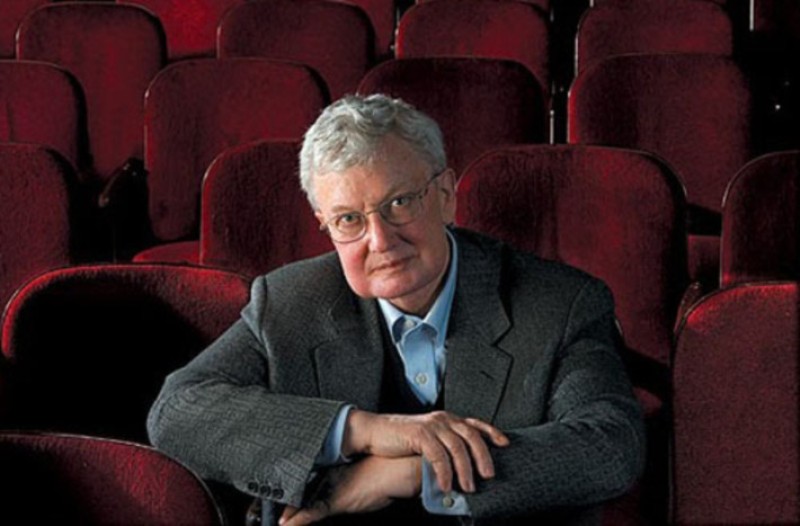
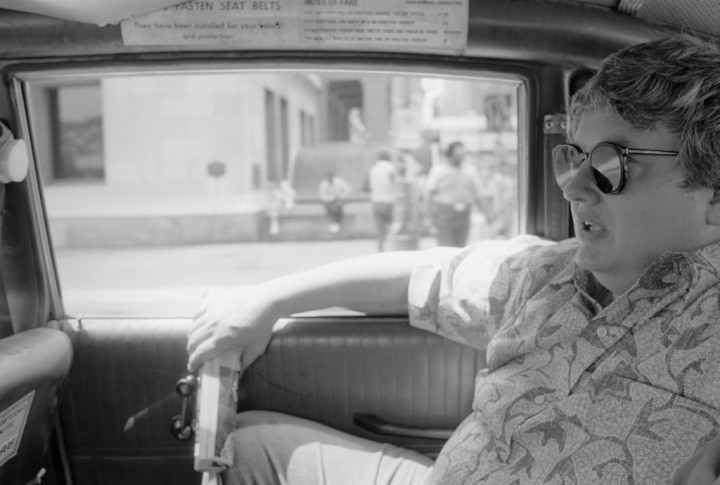
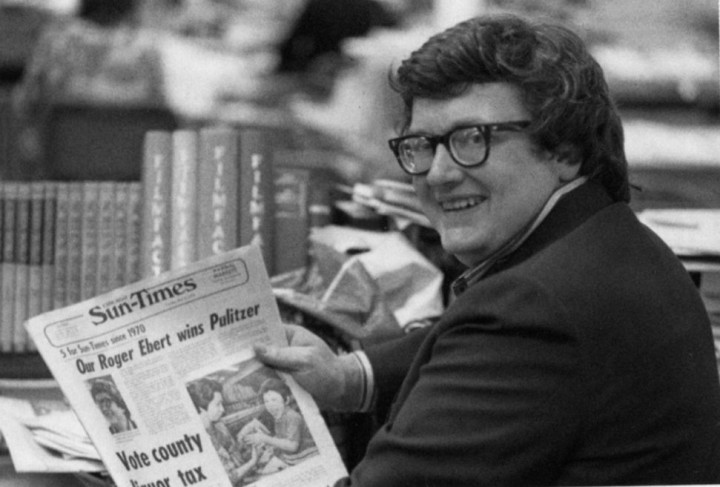
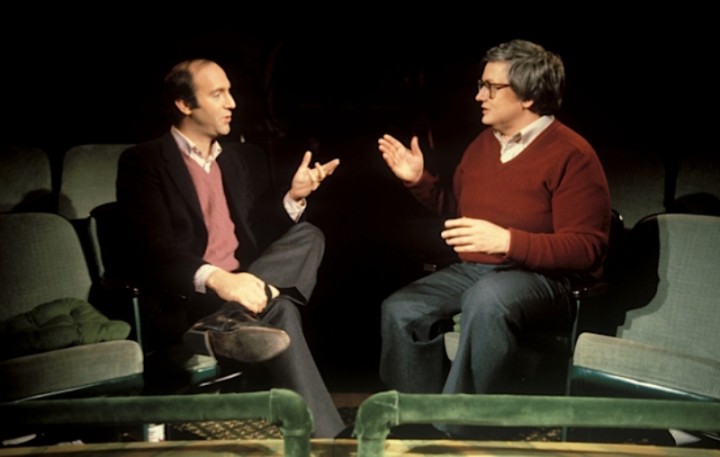
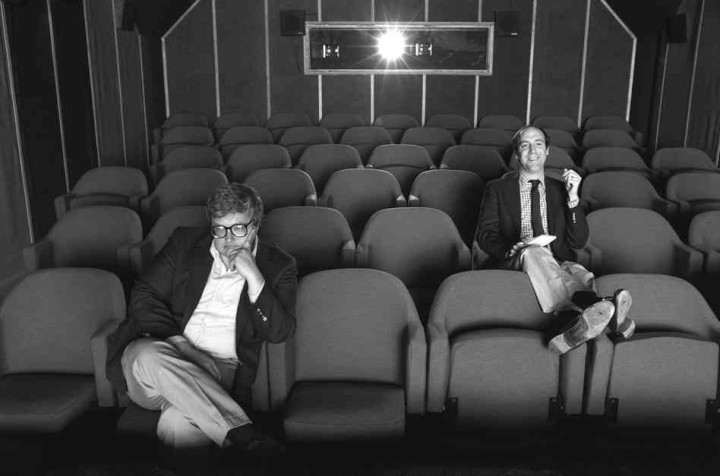

from the poster of an idealized, positively beatific Ebert, ethereally backlit by the light of a projection booth, staring in rapt wonder at an unseen movie screen. (It is perhaps the most cloying poster I’ve ever seen.)
Well..
http://i202.photobucket.com/albums/aa306/charlielyne/charlielyne001/ebert6.gif
Uh huh.
Is there any new “ball busting Siskel” clips that the world has never heard in this film?
Huh?
Those old outtakes.
https://www.youtube.com/watch?v=OkwVz_jK3gA
It’s a definitional difference I guess.
I loved it and I’m sure I will consider this my favorite film of 2014. Nostalgia is a big factor since I grew up watching his and Siskel’s show. (They were my Johnny Carson, didn’t go a week without watching the reviews) but I also felt joy, fear, depression, and hope while watching it. The care taking scenes were tough to watch and they hit close to home ( I was with my brother in his last years with cancer) but walking out of the movie I felt so happy having seen it. The joy and wonder of seeing film in a cinema cannot be matched by any other media ( live theatre is a close second) and I was happy to discover that I had a lot in common with Mr Ebert. It was also great to see clips of films that should be re-released in cinemas. Bonnie and Clyde in theatres now! I’m also shocked that Ken watched a documentary. Ha ha.